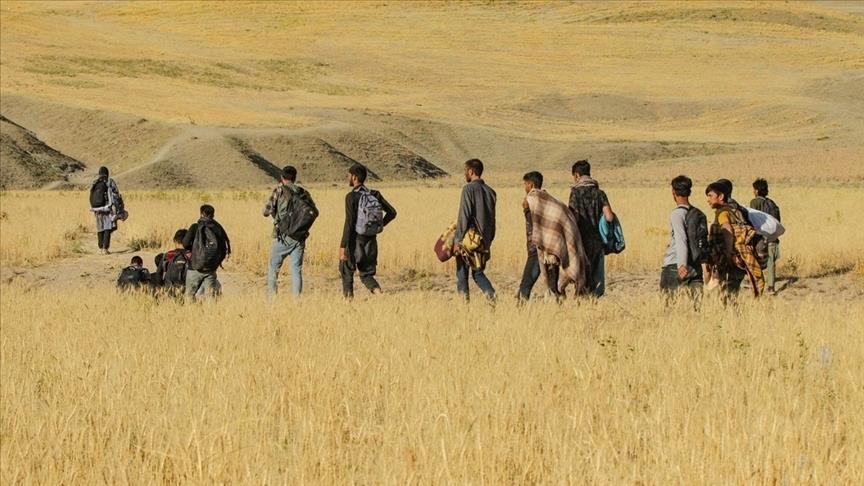Afghan returnees face dire conditions amid funding shortfalls, protection risks, humanitarian actors warn
Reintegration of people returning 'not easy' as resources limited, says Red Cross/Red Crescent head of delegation in Afghanistan

- 'Many arrivals are mentioning family separations at the border ... that's a big worry,' says UNHCR spokesperson
GENEVA
Amid more and more mass returns of Afghans from neighboring countries, humanitarian agencies are raising the alarm over an unfolding crisis marked by a lack of resources, protection risks, and uncertain prospects for reintegration.
The surge comes in the wake of separate efforts by Iran and Pakistan to expel undocumented foreigners, with both countries imposing deadlines and warning of deportation for those who fail to leave voluntarily.
According to the UN refugee agency UNHCR, over 1.2 million Afghans have returned or been forced to return from Iran and Pakistan so far this year.
Taking Anadolu's question at a press briefing in Geneva, Sami Fakhouri, head of the delegation for the International Federation of Red Cross and Red Crescent Societies (IFRC) in Afghanistan, said the reintegration process is "not easy" due to lack of resources, underlining the urgent need for international support as tens of thousands of people cross the border daily.
Noting the difficulties in the reintegration of returnees “in terms of support,” Fakhouri said “the authorities have a plan, but the resources also are limited.”
"They are preparing some areas, towns to receive some of those families," he added.
Citing UNHCR figures, Fakhouri said some tens of thousands of Afghans can cross the border in a single day, making reintegration a "tremendous effort" in a country already grappling with economic hardship and high unemployment.
"To reintegrate all those people also in the economy, in normal life, so they have livelihoods, it is not easy. It's a country with high unemployment," he said. "These people left, a lot of them, because to look for economic opportunities elsewhere ... and they might have to leave again."
Fakhouri also voiced concern about protection risks at the borders and within the country.
"We see young people coming back alone. We see women with children coming, they're being received as best they can," he said, highlighting limited shelter capacities and under-resourced psychosocial support mechanisms.
The IFRC, he said, believes “that returns should always be done voluntarily and that people should be treated with the utmost respect and dignity."
IFRC assistance 'falling short' as 'needs are much higher'
In one border area, Fakhouri praised the efforts of the Afghan Red Crescent Society, whose staff and volunteers are distributing over 6,000 hot meals a day and offering primary healthcare, shelter, water, and psychosocial support.
"But when you see the number of people arriving – peaking at over 30,000 in a single day – you realize that even that is not enough. For food, this means less than one meal per person," he said.
Fakhouri added: "We are doing our best with the resources we currently have, but the truth is we don't have enough resources as a humanitarian actor on the ground to cover even the average amount of people who cross into Afghanistan."
The IFRC is currently appealing for 25 million Swiss francs (over $31 million) to support Afghan Red Crescent operations across border crossings, transit camps, and resettlement areas. However, only 10% of the appeal has been funded, putting the continuity of services at risk.
"I worry about the continuation of services we are committed to providing in the medium to longer term, that should aim to help Afghans rebuild their lives and establish a livelihood," said Fakhouri.
"We are providing help, but the needs are much, much higher. So we are falling short."
Family separation at border
Babar Baloch, spokesperson for the UNHCR, echoed concerns over family separation, detention, and the harassment of returnees.
"Many arrivals are mentioning family separations at the border ... That's a big worry," he said in response to a question from Anadolu. "They also talk about harassment."
He stressed that many returnees come from urban backgrounds, having been born as refugees in exile, with little or no ties to Afghanistan, explaining why the majority of returnees are going either to the capital Kabul or Herat.
"What's going to happen to this population? This is a big question that Afghans have in their mind," he said.
"The situation at the border point, as we saw on July 4, (with) 50,000 returning in just one day, is very, very chaotic for us as humanitarians ... and for all those Afghans who are being uprooted and have to arrive into Afghanistan in this way."
Both the IFRC and UN agency warned that without urgent funding and political will, the situation could spiral into a deeper humanitarian catastrophe in a country where half the population already depends on some level of aid.
"Action is needed now so Afghanistan doesn't fall into a deeper crisis that will be impossible to emerge from," Fakhouri said.
He stressed that the Afghan Red Crescent Society might need to make some hard choices on who they can continue supporting, or not, if there is no change in the resources available.
Anadolu Agency website contains only a portion of the news stories offered to subscribers in the AA News Broadcasting System (HAS), and in summarized form. Please contact us for subscription options.







